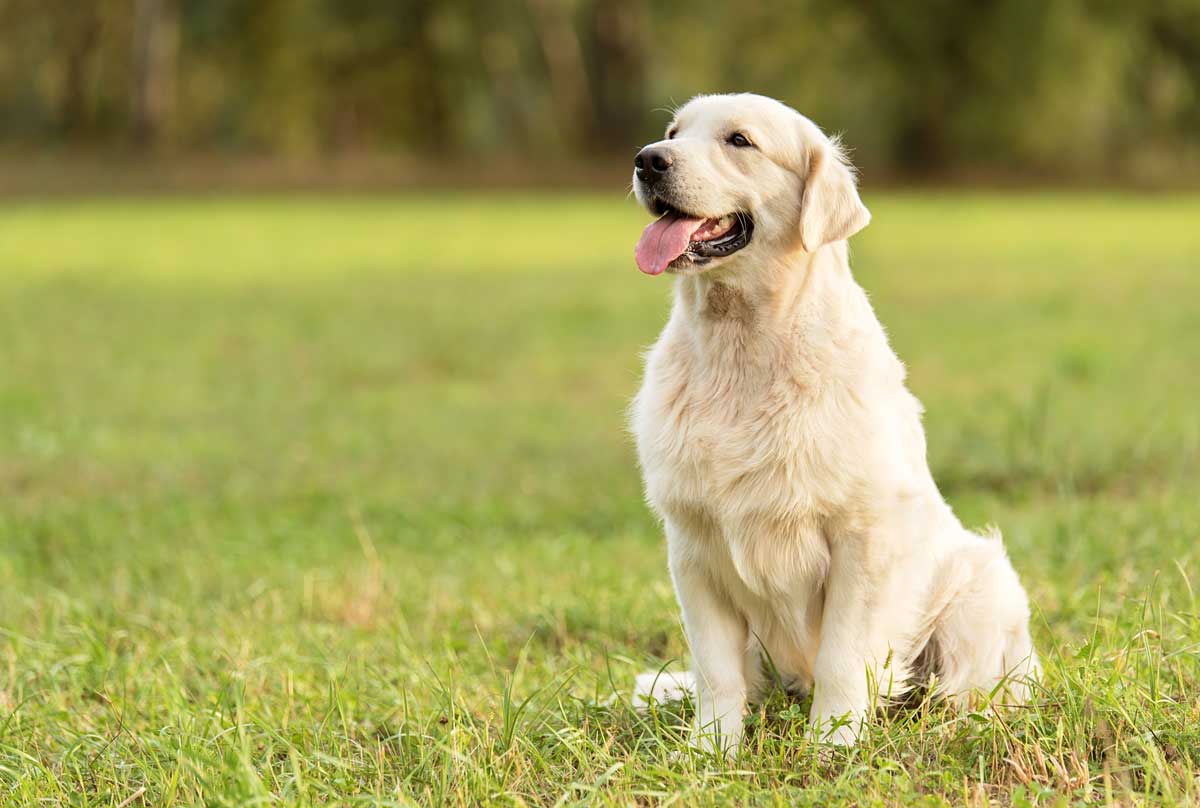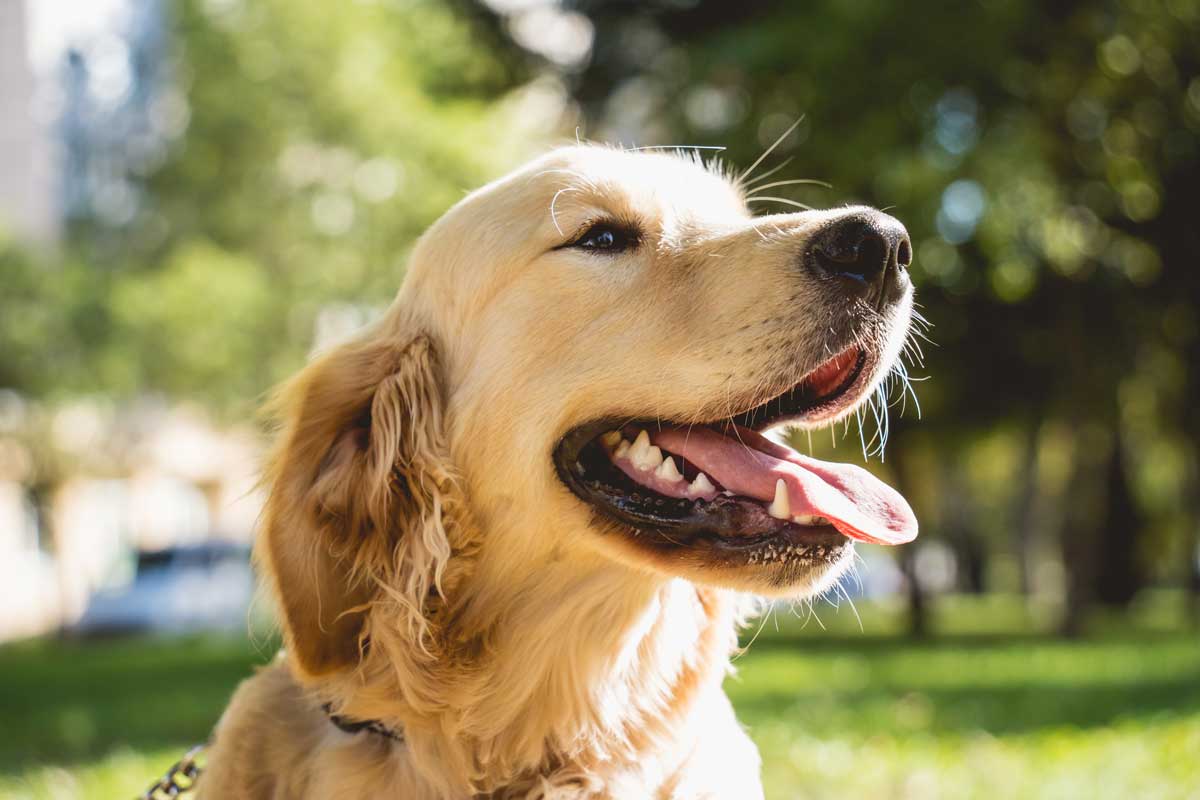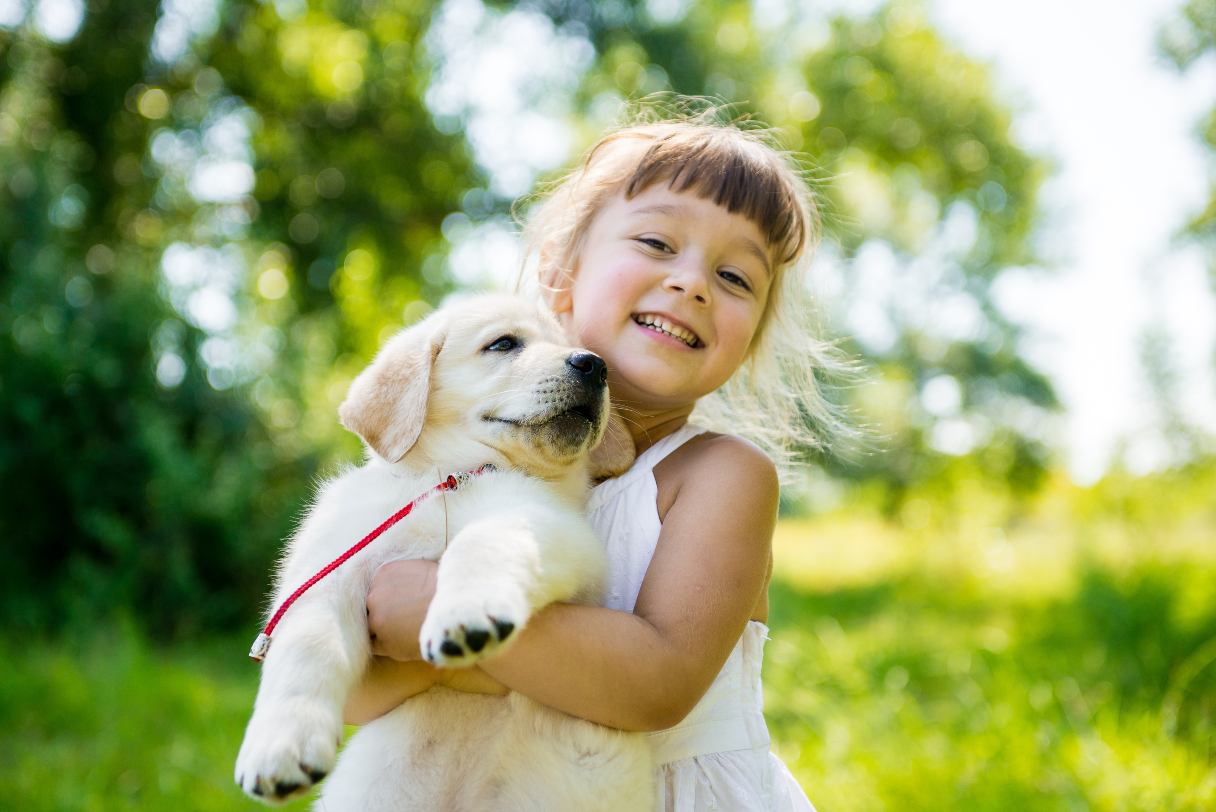“I have just met you, and I love you!” This famous line from Disney’s "Up" perfectly encapsulates the golden retriever's sweet personality. There’s a good reason this is one of the most popular dog breeds ever, according to the American Kennel Club. Joyful, outgoing, loyal and reliable, these are all-around good dogs. Bred for hunting, golden retrievers love life outdoors, but also make excellent family dogs.1
Here’s what you need to know about this breed, including temperament, health needs and what it’s like to live with these happy, exuberant dogs.
About the Golden Retriever
The golden retriever — commonly shortened to "golden" — made its first public appearance at a British dog show in 1908 and was an instant hit.1
Originally bred to serve as a gundog that could handle the rugged terrain of the Scottish Highlands, the golden’s handsome looks, outgoing personality and even-keeled temperament have made it a popular breed for a wide range of tasks. Beyond hunting, retrieving and engaging in sporting competitions, goldens may also be adept as search and rescue dogs or service dogs for the blind.1
Goldens have lived in the White House and have graced the silver screen as well as the small screen. All that, and they also make awesome family dogs and BFFs.1
Golden Retriever Appearance
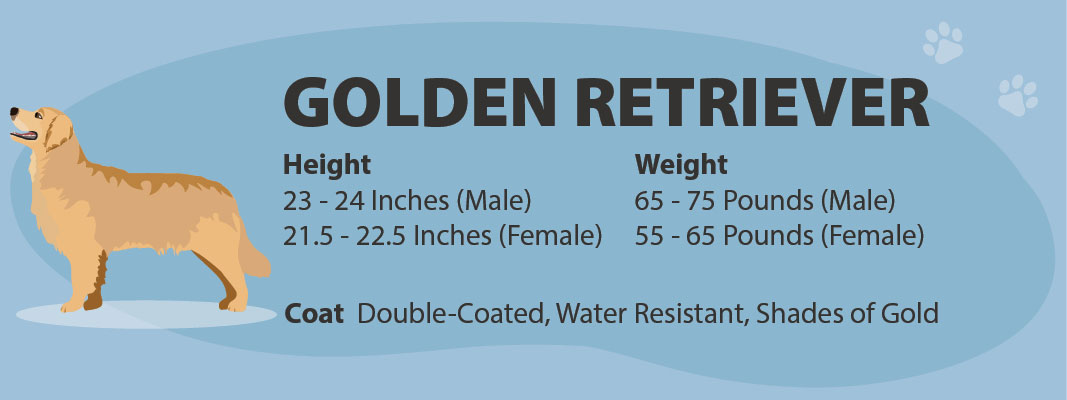
Goldens are large dogs, with males reaching heights of 23 to 24 inches at the shoulder and weighing 65 to 75 pounds on average.1 Females tend to be smaller, getting up to 21.5 to 22.5 inches in height and weighing 55 to 65 pounds.1 Otherwise, there’s not much difference in appearance between the sexes.
The official breed standard describes goldens as “a symmetrical, powerful, active dog, sound and well put-together.” They’re deep-chested, with a strong, straight back that slopes slightly toward a long tail that’s usually carried level or curving slightly upward. The head is broad, with a slightly rounded skull and a long muzzle that tapers slightly toward the nose. The face is sweet and intelligent, with soulful brown eyes and a dark nose. The ears hang next to the face, lying against the cheek and not extending below them.2
This is a double-coated breed with a dense, water-resistant outer coat. The coat is short on the head, paws and the front of the legs, but longer on the body. The fur may be straight or wavy, with some feathering on the backs of the legs and the undercarriage. Coloring is varying shades of gold from dark to light. There may be shade variations along the body, but other than a few white hairs on the chest, golden retrievers should have no other colors or markings.2
Golden Retriever Temperament
Goldens are generally happy dogs who love everybody, but that doesn’t mean they’re not loyal to their closest people. While they may not excel as guard dogs, you’ll know when strangers are around because your golden will most likely enthusiastically bark a loud “Hi!” at them. They’re not incessant barkers, but they can be slightly protective of their family when first encountering a stranger, whether dog or person. But it doesn’t take long for them to warm up and try to make a new friend.1
These dogs love fun and adventure, but they can be serious when provided with a job, such as being a vigilant retriever or guide dog. They have a lot of energy that usually presents as boisterousness. Golden puppies need a lot of socialization and training in obedience and good manners so they’ll know how to cool it once they’re big.1
That said, goldens tend to maintain a puppy-like joy and zest for life well into adulthood. Unlike other intelligent, energetic breeds who can be a bit unpredictable, goldens are generally steady and reliable, especially if they have good training and socialization.1
Living With a Golden Retriever
Can you provide the right fur-ever home for a golden retriever? Here's what's involved in living with and caring for a golden, along with tips for helping them live their best life.
Who they're best for
These energetic, overgrown pups do best with an active owner or family who can keep up with their energy and craving for adventure.1
Golden retrievers have a well-deserved reputation for getting along well with children. However, golden retriever puppies are highly energetic and need lots of training, socialization and exercise. Families with very young children should be aware that adopting a golden puppy is very much like taking on another toddler.3
In this case, adopting an older dog who has calmed down and already been socialized might be a more feasible option. It might be better to hold off on getting a golden puppy until the children are old enough to participate in its care and training.
Living space
Goldens can adapt well to city or country, house or apartment, as long as they get to be with their family. They’re extremely social, and while they typically do great with other pets, they want to be near their person or people. This is not a dog that can be left outside or for extended periods.3
While a fenced yard is great for letting your golden out to do their business, a yard may not fulfill their exercise needs. Not only that but these inventive escape artists shouldn’t be left outside unsupervised, no matter how sturdy the fence.3
Exercise and activity
Goldens need a variety of exercise and will love to keep you company on hikes, runs, bike rides or long walks. They also excel at dog sports like agility, tracking and field trials.1
As intelligent dogs who are described as “eager to do your bidding,” goldens are a breeze to train. Training should begin early in life and be kept up throughout their lives — not only to reinforce good behavior, but also to provide mental stimulation.1
Grooming
Golden retrievers are moderate shedders year-round but have heavy shedding seasons twice a year. Daily brushing will be needed during these times. Otherwise, going over them once or twice weekly with a slicker brush should keep the hair under control.1
They only need baths when they’re dirty or too stinky to live with, and nails should be trimmed once or twice a month. Regular toothbrushing will help keep their teeth and gums healthy in between professional pet dental cleanings.1
Golden Retriever Health and Life Expectancy
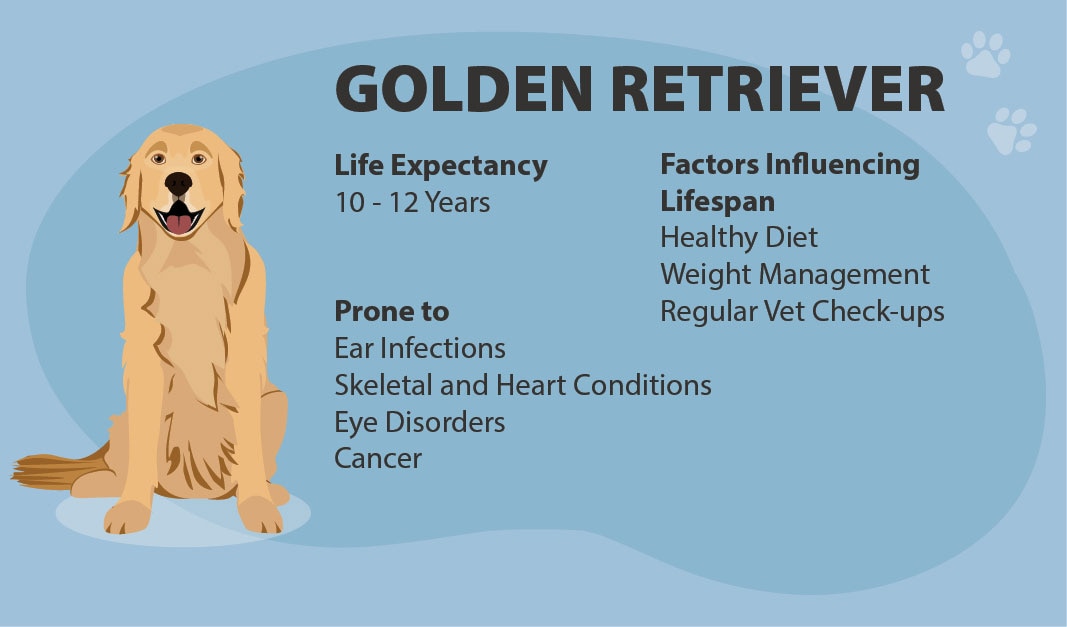
The average life expectancy for golden retrievers is 10 to 12 years.1 However, many factors determine an individual dog’s lifespan. A healthy diet, weight management and regular veterinary checkups can do a lot to help your golden live a long and healthy life.
Weight management is important for goldens, especially as they age.4 Feed them high-quality dog food appropriate to their life stage.1 It's even better if the food has a nutritional profile approved by the Association of American Feed Control Officials (AAFCO).4 Food that is made especially for large-breed dogs and puppies can provide additional nutritional support for rapidly growing and maintaining large bones.4
Be sure to measure their food to avoid overfeeding, and don't give them table scraps or fatty foods.1 Training treats should be factored into their daily calories.1 Consider setting aside a portion of their daily kibble to use for training, or swap out calorie-laden treats for healthy fruit or vegetable alternatives.
Preventive care can help improve the overall health of your golden. Despite these efforts, they may still face hereditary conditions and diseases that are common to this breed. Being well-informed about these common health issues can help in early detection and management.
Ear infections
Golden retrievers are prone to developing ear infections.1 Signs include ear scratching, head shaking, redness, odor and dark discharge.5 Weekly ear checks can help you catch and treat signs of an infection before it becomes severe.
Hip dysplasia
Hip dysplasia is a condition in which the hip bone doesn't fit properly into the hip socket. It's painful and can lead to osteoarthritis later in life, but it might be treatable with surgery or nutrition and lifestyle changes.6
Elbow dysplasia
Elbow dysplasia is a similar condition that affects the elbow socket. Like hip dysplasia, it's a treatable condition, but surgical intervention may be needed.7
Progressive retinal atrophy
This genetic eye disorder, also known as PRA, is caused by progressive degeneration of the retina's photoreceptor cells. It can result in gradual vision loss and, eventually, blindness. There is no known treatment, but with some environmental adjustments to keep dogs safe, they can live happy and fulfilling lives without their vision.8
Pigmentary uveitis
Also known as golden retriever pigmentary uveitis (GRPU), this is a genetic eye disorder specific to the breed. It causes inflammation of the eye that can lead to additional eye and vision issues, including irritation, conjunctivitis and in severe cases, glaucoma. Dogs with this condition will need to be monitored by a veterinary ophthalmologist.9
Aortic stenosis
Aortic stenosis is a heart condition caused by a narrowing of the aortic valve. This hinders the heart's ability to move blood effectively throughout the body. It's usually managed through medication, although surgical intervention may be possible. In some cases, this condition makes dogs susceptible to sudden death.10
Hemangiosarcoma
Goldens are susceptible to this kind of cancer.11 It is typically found in the spleen, the liver and the right auricle of the heart.12 This, too, can lead to sudden death.12 Surgery is the most common course of treatment, but chemotherapy (and sometimes radiation) may also be considered.12
Osteosarcoma
Osteosarcoma is a type of bone cancer that mainly affects the long bones in the upper arms, lower thighs and upper shins. It may spread to other bones, as well as the lungs. Treatment may involve chemotherapy, radiation and/or surgery.12
Golden retrievers were actually the subject of a well-known study on the health effects of early spaying and neutering, which found that having either procedure done before the dog is finished growing increases the likelihood of these cancers.13 Be sure to talk to your vet about the best age to have your golden spayed or neutered.
Buying or Adopting a Golden Retriever
Depending on your location and whether the parents are from a championship bloodline, you can usually expect to pay somewhere between $3,000 and $5,000 or more for a registered golden retriever puppy from a reputable breeder. This generally includes genetic testing and early healthcare and vaccinations.14
Golden retrievers of all ages can also be found at pet shelters and rescues. Adopting a golden in need of a good home will likely cost around $400 to $600, depending on where you adopt.15 Seniors and special needs dogs may cost less to adopt.16 Adoption fees typically include vaccines, spaying or neutering and additional healthcare.15
If you’d like to adopt a golden, the Golden Retriever Society can help you find a reputable golden retriever rescue in or near your state.
Frequently Asked Questions About Golden Retrievers
Here are some answers to frequently asked questions about golden retrievers.
CareCredit Credit Card Financing for Dogs
The CareCredit credit card provides a convenient way to pay for your dog's vaccinations and other health and wellness expenses, including exams, medications and products at providers in the CareCredit network.* Continue your wellness journey by downloading the CareCredit Mobile App. You can find a provider on the go, manage your CareCredit account and easily access the Well U blog for more great articles, podcasts and videos. Use our Acceptance Locator to find a veterinarian that accepts CareCredit to help keep your pet healthy and happy for a lifetime of love.
In addition to pet care, you can also use your CareCredit credit card for dentistry, cosmetic, vision, hearing, health systems, dermatology, pharmacy purchases, spa treatments and so much more within the CareCredit network. How will you invest in your health and wellness next?
Author Bio
Jean Marie Bauhaus is a freelance writer and novelist who has been writing pet content since 2013. Her work has appeared on Forbes.com, Hill's Pet, Chewy, AKC.org and more.





